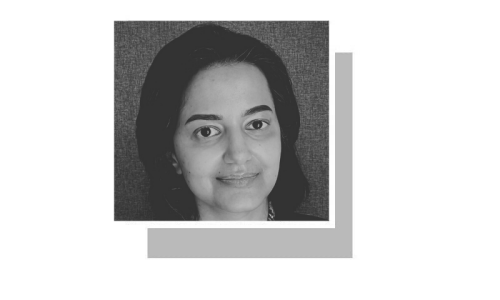THE financial sector is doing exceedingly well, says a comprehensive report of the State Bank of Pakistan in its, ‘Financial Sector Assessment: 2004’.
The banks are flourishing with double-digit growth for the last three years. The corporate sector is performing exceedingly well as their stock market performance highlights, making the Karachi 100 index that crashed in mid-March touch again 9,000 last week despite the inestimable adverse consequences of the earthquake. The public finances too are doing well, exceeding budget projections.
The hitherto ailing public sector enterprises are doing very well as their soaring share prices indicate. The overall size of the financial sector for the financial year ending 2004 increased by whopping Rs589 billion to reach a total of Rs4.5 trillion, showing a growth of 14.5 per cent over 2003.
The structure of the ownership of the financial sector showed considerable change following large scale privatization and raised the ownership of the private sector to 56.6 per cent and the public sector including the national service deposits came down to 43.4 per cent.
At the same time, the State Bank cautions the commercial banks against lapses in credit appraisal methodology as that could have an adverse impact on the non-performing loans of Rs201.4 billion. In addition, there is a need for banks to conform to Basil II to fall in line steadily with the best banking practices of the world.
One reason for the private financial sector to become so large is the inflow of four billion dollars as home remittances in 2004 since they began leaping up after 9/11. The major question now is, whether the official policy of letting too many banks set up their own insurance companies is good for the banking sector as well as the general insurance business?
Of course, we do not need an unending number of banks nor do we need an endless number of tiny insurance companies. Earlier, there were about 50 insurance companies that were reduced by the Security and Exchange Commission of Pakistan (SECP) to about half of that as the they did not
conform to the required standards nor is the twin like relationship between banks and insurance companies very welcome.
If well-managed, general insurance companies are cash cows. The State Bank report shows that the non-life industry showed improvements in its size and profitability which increased by 60.1 per cent in the year 2004. The report says that that with assets of Rs31 billion, insurance companies collected gross premium of Rs32 billion and their net premium was Rs25 billion.
Hence, the banks set up their own insurance companies in spite of the large profits banks have been making in recent years. Secondly, is such excessive concentration of capital in a few hands or institutions good for a healthy economy in a developing country?
Free markets strength capitalism. That does not mean there should be excessive concentration of capital in a few hands through multiple ownership of too many companies of assorted kinds. In its annual World Development Report, titled “equity and development”, the World Bank moving away from its failed theory of wealth eventually trickling down to the poor, now couples development with equity. It argues poverty cannot be reduced easily without equity in society.
And equity it defines as equality of opportunity for all in education, public health, employment, housing and an effective voice for the poor.
It is too well known that many of the officers of banks who insure the assets of their borrowers extract a large part of the commission from insurance representatives. Some of them extract the total commission as a bribe to give their business to the insurance companies.
On that basis banking officers can take large risks by insuring unprotected loans. But if the banks set up their own insurance companies, bank managers may find themselves deprived of such illegal gratification at the same time the new insurance companies may insure unprotected loans and put the banks in serious jeopardy in a country with non-performing loans of Rs201 billion for commercial banks alone.
The financial history of Pakistan in 1950’s and 60’s shows that the Adamjees owned the MCB and the Adamjee Insurance. And now Mian Mansha— the wizard of the textile and cement— has taken over MCB and following that the Adamjee Insurance Company. AmirAli Fancy owned commerce bank and Jubilee Insurance. The Standard Bank with its chequered history had the Standard Insurance. later Yusuf Shirazi came to have the Atlas conglomerate and Muslim Insurance.
Syed Babar Ali had the International Investment Bank and the International Insurance which is doing exceedingly well. The Dawoods had the Central Insurance and have come with an investment bank now. Lakhania have the Century Insurance and no bank.
While the Gul Ahmed family has taken over Bolan Bank and named it My Bank. The leaders of the Capital Market have also come into banking notably Jehangir Siddiqui, Khadim Ali Shah Bukhari & Sons.
The military is also in the insurance business with Askari Insurance and Shaheen Insurance. And now instead of the owners of banks setting up separate insurance companies, the banks themselves are putting up insurance companies. Among such banks are the PICIC bank which has set up the PICIC Insurance and the Saudi Pak Insurance set up by the Saudi-Pak Bank. In the pipeline are insurance companies being set up by the Bank of Punjab and Bank Alfalah. Far more banks are likely to follow the lead of these banks who have set up insurance companies. As a result of such developments a reliable check of the assets pledged against loans from banks will vanish as the banks themselves with the approval of their insurance companies be the judge of reliability of large investment loans and that goes against the State Bank’s warning against lapses in credit appraisal process.
We should be prepared for more loan defaults and the vigilance of the lenders weaken in the interest of larger business.
Will the State Bank and the Security and Exchange Commission look into this problem carefully and analytically and prevent all possible abuses for which there is plenty of scope.
Already the loan default has increased in recent times not because of default by big borrowers but by default of small borrowers through consumer banking and housing and auto loans.












































